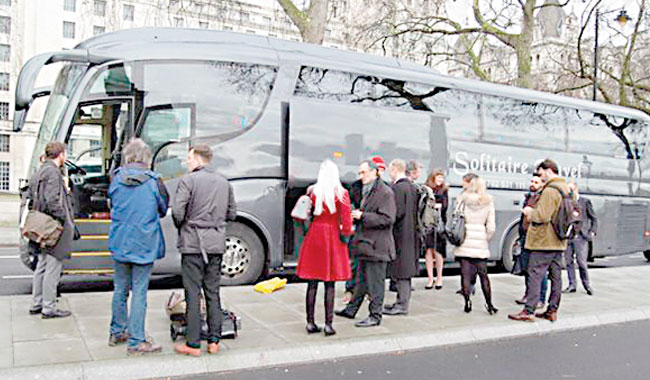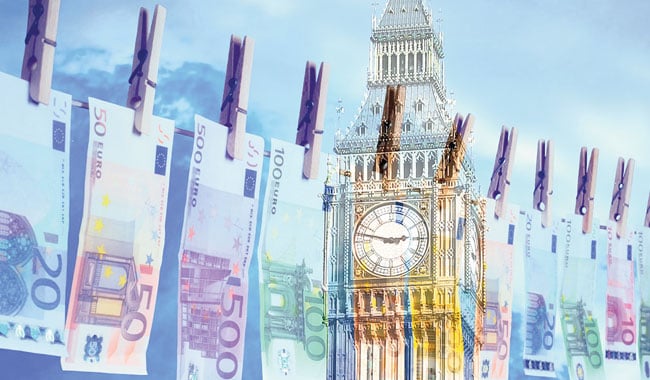Corrupt foreigners who launder money through luxury London homes face crackdown
Foreigners suspected of using London’s property market to launder ill-gotten gains will be forced to declare where they got their money from, under new government proposals to fight global corruption.
In a bid to end Britain’s reputation as a haven for dirty money, any overseas politician or public servant who makes notably lavish purchases in the UK could be forced by police to explain the source of their income.
The measures, known as “unexplained wealth orders”, will form part of the agenda on Thursday as David Cameron hosts an international anti-corruption summit in London.
It comes in the wake of the publication of a second tranche of the so-called Panama Papers, which have highlighted concerns that offshore tax havens have been used to launder hundreds of millions of pounds through London’s booming property market.

According to the anti-corruption group Transparency International, some 36,000 homes in London 33 boroughs are currently registered as being owned by firms in offshore tax havens such as the British Virgin Islands, which do not have to reveal the buyers’ real identities.
In Westminster, this accounted for 9.3 per cent of properties, or nearly one in ten, while in Kensington and Chelsea - London’s wealthiest borough - the figure was 7.3 per cent.
While most such purchases are thought to be legitimate, anti-corruption campaigners say there is little doubt that some have been bought using the proceeds of embezzlement or other crimes.
The National Crime Agency believes that such is the scale of the problem that criminal money from overseas has artificially boosted London house prices.
Transparency International and other anti-corruption organisations also want the government to introduce new legislation that would force any tax-haven registered firm to declare who its true beneficiary was before being allowed to purchase property in the UK.
Under the “unexplained wealth orders”, anyone who was suspected of purchasing a property that was well beyond their apparent means would also have to tell the authorities how they obtained the cash.
The new rules would apply in particular to “politically exposed persons” - those who are known to have held public office either currently or in recent years as a politician or civil servant.

Past cases include the likes of James Ibori, a former governor of Nigeria’s Delta State, who was jailed for 13 years in 2012 after pleading guilty at a court in London to money laundering and fraud offences involving up to £150m from the Nigerian public purse.
He allegedly bought four homes in Britain, including a £2m mansion in Hampstead and properties in St John’s Wood and Dorset.
Rachel Davies, Head of UK Advocacy and Research at Transparency International, told The Telegraph:
“This would allow law enforcement to look closely at a politician or one of their associates who had, say, bought two £4m houses in Hampstead despite being only on a salary of £100,000.” She added that rules requiring firms in offshore tax havens to declare who the real owner of a home was were much overdue in Britain, where the booming property market in London made home ownership a very attractive investment.
“We are not saying that every property bought by a firm registered to an offshore tax haven is a money laundering vehicle, but the sheer number of them in London creates an environment where it is very easy for the corrupt to hide, and there is most likely no smoke without fire.” The measures are part of an action plan that the government has put out ahead of Thursday’s conference, which seeks the creation of “a new power to require individuals to declare their sources of wealth”.
As well as those suspected of stealing from the public purse, it could also be used against corrupt businesspeople and those involved in drug trafficking and terrorism financing.
The move is still at the consultation stage, and may face legal hurdles, but Alan Sheeley, a civil fraud and asset recovery expert at the law firm Pinsent Masons, said he was hopeful that the government would press ahead with it.
“If someone cannot identify where their money is coming from, why should they be able to keep that money if it comes from ill gotten gains?” he asked. “It is a real opportunity.”
Such orders may, however, may enjoy only limited success in practice if those who are targeted by them challenge the figures in the courts, which can lead to lengthy and expensive assets hearings.
The Home Affairs Select Committee’s review of the Proceeds of Crime Act heard evidence that for estimated £100 of criminal profits, only around 0.25 pence was regained through assets recovery hearings.
The conference is being attended by a number of world leaders, including the Nigerian president, Muhammadu Buhari, who has made an anti-corruption a key feature of his time in office. On Tuesday, Cameron faced embarrassment after being caught on camera telling the Queen that both Nigeria and Afghanistan were “fantastically corrupt”.
Every property bought by a firm registered to an offshore tax haven is not a money launderingvehicle, but the sheer number of them in London creates an environment where it is very easy for the corrupt to hide, and there is most likely no smoke without fire.....
-
 Savannah Guthrie Sends Desperate Plea To Mom Nancy Kidnapper
Savannah Guthrie Sends Desperate Plea To Mom Nancy Kidnapper -
 NBA All-Star 2026 Shake-up: Inside The New USA Vs World Tournament Format
NBA All-Star 2026 Shake-up: Inside The New USA Vs World Tournament Format -
 Warner Bros Consider Reopening Deal Talks With Paramount, Says Reports
Warner Bros Consider Reopening Deal Talks With Paramount, Says Reports -
 Andrew Mountbatten Windsor Faces Future With UK MPs, Says Expert
Andrew Mountbatten Windsor Faces Future With UK MPs, Says Expert -
 Shamed Andrew Told 'nobody Is Above The Law' Amid Harrowing Silence
Shamed Andrew Told 'nobody Is Above The Law' Amid Harrowing Silence -
 Gisele Bundchen Melts Hearts With Sweet Bike Ride Glimpse Featuring Son
Gisele Bundchen Melts Hearts With Sweet Bike Ride Glimpse Featuring Son -
 Prince William Found Meghan Markle ‘quite Refreshing’ At Start
Prince William Found Meghan Markle ‘quite Refreshing’ At Start -
 Kate Middleton Knew Should Could Not Be ‘voice Of Reason’ With Prince Harry
Kate Middleton Knew Should Could Not Be ‘voice Of Reason’ With Prince Harry -
 Rihanna Has Wardrobe Malfunction At A$AP Rocky Fashion Show
Rihanna Has Wardrobe Malfunction At A$AP Rocky Fashion Show -
 Prince Harry Felt System Had ‘one Rule For Him, One For Prince William’
Prince Harry Felt System Had ‘one Rule For Him, One For Prince William’ -
 Jake Paul's Fiancée Sends Him Over The Moon Over Stunning Victory
Jake Paul's Fiancée Sends Him Over The Moon Over Stunning Victory -
 Harper Beckham Sends Valentine’s Love Amid Brooklyn Family Drama
Harper Beckham Sends Valentine’s Love Amid Brooklyn Family Drama -
 Why Prince William, Kate Middleton 'partnership' Is Important For Monarchy
Why Prince William, Kate Middleton 'partnership' Is Important For Monarchy -
 Katie Price Drama Escalates As Family Stays In Touch With Ex JJ Slater
Katie Price Drama Escalates As Family Stays In Touch With Ex JJ Slater -
 Critics Target Palace Narrative After Andrew's Controversy Refuses To Die
Critics Target Palace Narrative After Andrew's Controversy Refuses To Die -
 Sarah Ferguson’s Delusions Take A Turn For The Worse: ‘She’s Been Deserted’
Sarah Ferguson’s Delusions Take A Turn For The Worse: ‘She’s Been Deserted’



